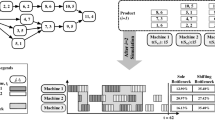Abstract
The efficiency of wafer sorting scheduling is of particular importance in semiconductor fabrication, especially in the face of strong industry competition. This paper presents a novel hybrid artificial immune system (HAIS) algorithm for solving the wafer sorting scheduling problem, aimed at minimizing the total setup time and the number of testers used. To evaluate the performance of the proposed HAIS algorithm and to compare it with existing approaches, computational experiments were conducted on 480 simulation instances generated from the characteristics of a real wafer probe centre. The experimental results revealed that the proposed HAIS algorithm is highly effective and efficient, as compared with state-of-the-art algorithms on the same benchmark.



Similar content being viewed by others
References
Allahverdi A, Ng CT, Cheng TCE and Kovalyov MY (2008). A survey of scheduling problems with setup times or costs. European Journal of Operational Research 187 (3): 985–1032.
Bang JY and Kim YD (2011). Scheduling algorithms for a semiconductor probing facility. Computers and Operations Research 38 (3): 666–673.
Chen TR, Chang TS, Chen CW and Kao J (1995). Scheduling for IC sort and test with preemptiveness via Lagrangian relaxation. IEEE Transactions on Systems, Man, and Cybernetics 25 (8): 1249–1256.
Cheng TCE and Sin CCS (1990). A state-of-the-art review of parallel-machine scheduling research. European Journal of Operational Research 47 (3): 271–292.
Chiang TC, Shen YS and Fu LC (2008). A new paradigm for rule-based scheduling in the wafer probe centre. International Journal of Production Research 46 (15): 4111–4133.
Ellis KP, Lu Y and Bish EK (2004). Scheduling of wafer test processes in semiconductor manufacturing. International Journal of Production Research 42 (2): 215–242.
Engin O and Döyen A (2004). A new approach to solve hybrid flow shop scheduling problems by artificial immune system. Future Generation Computer Systems 20 (6): 1083–1095.
Gong M, Jiao L and Zhang X (2008). A population-based artificial immune system for numerical optimization. Neurocomputing 72 (1-3): 149–161.
Hsieh YC, You PS and Liou CD (2009). A note of using effective immune based approach for the flow shop scheduling with buffers. Applied Mathematics and Computation 215 (5): 1984–1989.
Huang KL and Liao CJ (2006). Ant colony optimization combined with taboo search for the job shop scheduling problem. Computers and Operations Research 35 (4): 1030–1046.
Lin JT, Wang FK and Lee WT (2004). Capacity-constrained scheduling for a logic IC final test facility. International Journal of Production Research 42 (1): 79–99.
Lin SW and Ying KC (2008). A hybrid approach for single-machine tardiness problems with sequence-dependent setup times. Journal of the Operational Research Society 59 (8): 1109–1119.
Lin SW and Ying KC (2009). Applying a hybrid simulated annealing and tabu search approach to non-permutation flowshop scheduling problems. International Journal of Production Research 47 (5): 1411–1424.
Lin SW, Lee ZJ, Ying KC and Lin RH (2011). Meta-heuristic algorithms for wafer sorting scheduling problems. Journal of the Operational Research Society 62 (1): 165–174.
Musilek P, Lau A, Reformat M and Wyard-Scott L (2006). Immune programming. Information Sciences 176 (8): 972–1002.
Naderi B, Khalili M and Tavakkoli-Moghaddam R (2009). A hybrid artificial immune algorithm for a realistic variant of job shops to minimize the total completion time. Computer & Industrial Engineering 56 (4): 1494–1501.
O'Connor JJ and Robertson EF (2012). Student’s t-Test, MacTutor History of Mathematics Archive. University of St Andrews, http://www-history.mcs.st-andrews.ac.uk/Biographies/Gosset.html.
Ovacik IM and Uzsoy R (1996). Decomposition methods for scheduling semiconductor testing facilities. International Journal of Flexible Manufacturing Systems 8 (4): 357–387.
Pearn WL, Chung SH and Yang MH (2002a). A case study on the wafer probing scheduling problem. Production Planning & Control 13 (1): 66–75.
Pearn WL, Chung SH and Yang MH (2002b). The wafer probing scheduling problem (WPSP). Journal of the Operational Research Society 53 (8): 864–874.
Pearn WL, Chung SH, Yang MH and Chen YH (2004). Algorithms for the wafer probing scheduling problem with sequence-dependent set-up time and due date restrictions. Journal of the Operational Research Society 55 (11): 1194–1207.
Pearn WL, Chung SH, Yang MH and Shiao KP (2008). Solution strategies for multi-stage wafer probing scheduling problem with reentry. Journal of the Operational Research Society 59 (5): 637–651.
Tan KC, Goh CK, Mamun AA and Ei EZ (2008). An evolutionary artificial immune system for multi-objective optimization. European Journal of Operational Research 187 (2): 371–392.
Tavakkoli-Moghaddam R, Rahimi-Vahed A and Mirzaei AH (2007). A hybrid multi-objective immune algorithm for a flow shop scheduling problem with bi-objectives: Weighted mean completion time and weighted mean tardiness. Information Sciences 177 (22): 5072–5090.
Yang J and Chang TS (1998). Multiobjective scheduling for IC sort and test with a simulation test bed. IEEE Transactions on Semiconductor Manufacturing 11 (2): 304–315.
Ying KC (2012). Scheduling identical wafer sorting parallel machines with sequence-dependent setup times using an iterated greedy heuristic. International Journal of Production Research 150 (10): 2710–2719.
Ying KC and Cheng HM (2010). Dynamic parallel machine scheduling with sequence-dependent setup times using an iterated greedy heuristic. Expert Systems with Applications 37 (4): 2848–2852.
Zandieh M, Fatemi Ghomi SMT and Moattar Husseini SM (2006). An immune algorithm approach to hybrid flow shops scheduling with sequence-dependent setup times. Applied Mathematics and Computation 180 (1): 111–127.
Zhang Z (2007). Immune optimization algorithm for constrained nonlinear multiobjective optimization problems. Applied Soft Computing 7 (3): 840–857.
Zhou Y, Beizhi Li and Yang J (2006). Study on job-shop scheduling with sequence dependent setup times using biological immune algorithm. International Journal of Advanced Manufacturing Technology 30 (1-2): 105–111.
Acknowledgements
This research was financially supported in part by the National Science Council of the Republic of China (Taiwan), under the Contract Nos. NSC 100-2221-E-027-040-MY2 and NSC 101-2410-H-182-004-MY2.
Author information
Authors and Affiliations
Rights and permissions
About this article
Cite this article
Ying, KC., Lin, SW. Efficient wafer sorting scheduling using a hybrid artificial immune system. J Oper Res Soc 65, 169–179 (2014). https://doi.org/10.1057/jors.2013.8
Received:
Accepted:
Published:
Issue Date:
DOI: https://doi.org/10.1057/jors.2013.8




